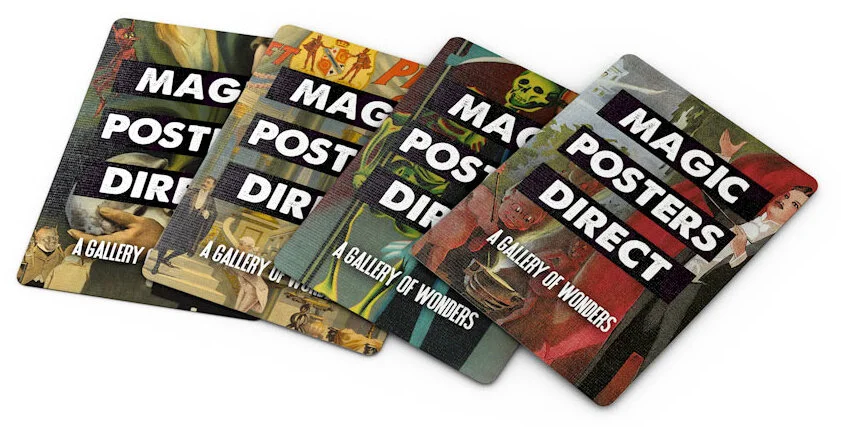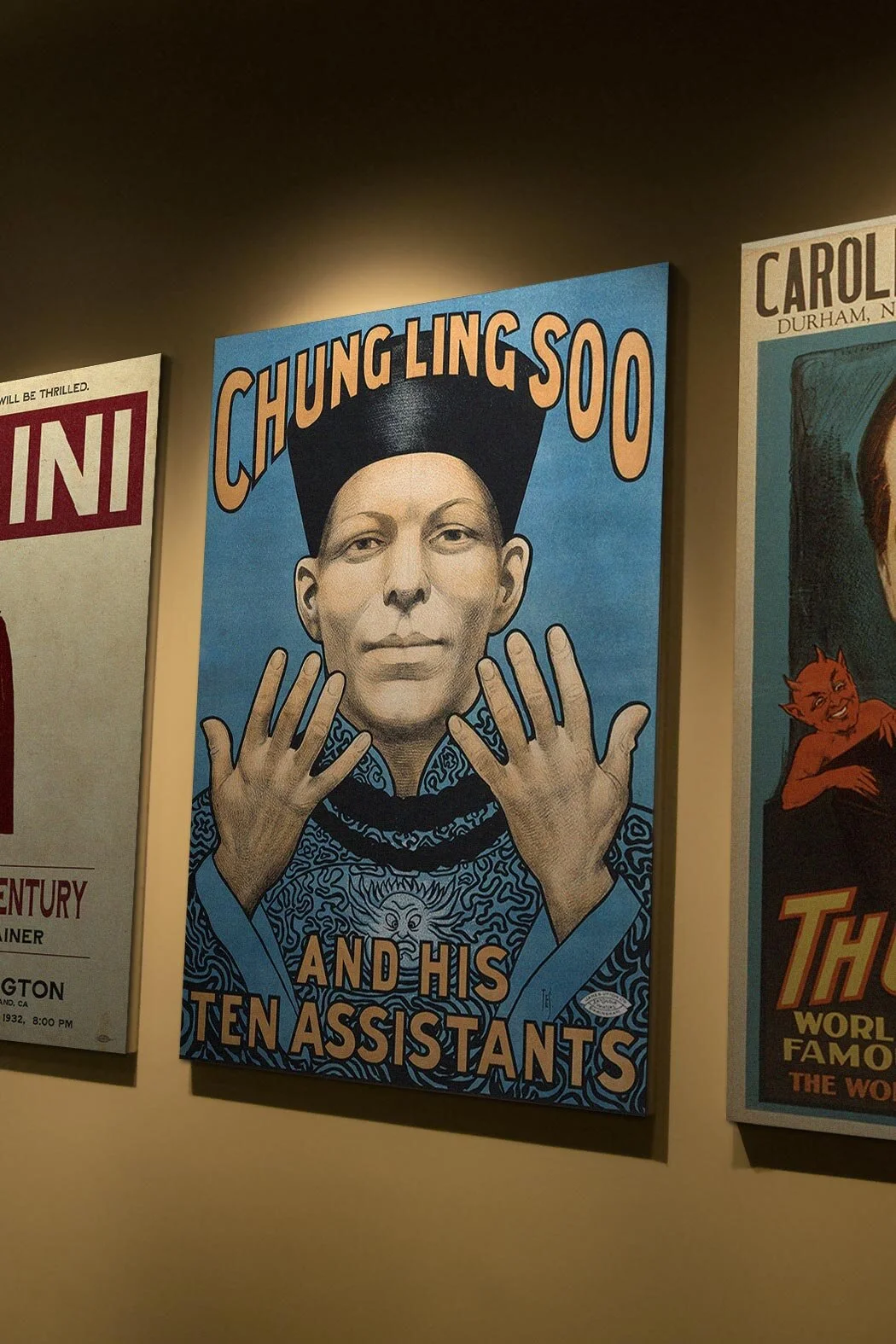Chung Ling Soo
The greatest illusion of the Chinese magician Chung Ling Soo was that he wasn’t Chinese. William Ellsworth Robinson (April 2, 1861 - March 24, 1918) took the name as a variation of a real Chinese stage magician - Ching Ling Foo - and performed many of the tricks that Foo had made famous.
Robinson performed his first magic show at the age of 14 and began performing professionally in vaudeville shortly thereafter. He initially performed under the name "Robinson, the Man of Mystery". Robinson earned a decent living performing his act but was eager to become a headliner on vaudeville. In 1887, he began performing “Black Art Illusions” under the name "Achmed Ben Ali". The act and Robinson's new stage closely resembled that of German magician Max Auzinger, who performed under the name "Ben Ali Bey". (As Auzinger never toured the United States, the resemblance went largely unnoticed at the time).
By 1896, Robinson had performed his acts in shows for Harry Kellar and Alexander Hermann . After Herrmann's death in 1896, Robinson decided to strike out on his own. Around this time, Robinson learned of a challenge issued by Chinese stage magician Ching Ling Foo. In a gimmick that was standard for magicians of that era, Foo offered a prize of $1,000 to any person who could successfully duplicate his illusions. Robinson, who had watched Foo's act when he toured the United States and figured out how his illusions worked, accepted the challenge. However, Foo refused to meet with him as Robinson had accepted another previous challenge issued by Foo and lost. The snub left Robinson upset. In 1898, he authored the book Spirit Slate Writing and Kindred Phenomena. The book exposed the tricks of slate writing and a number of devices that fraudulent mediums would use to pretend to contact the dead.
In 1900, Robinson learned that an agent was looking for a Chinese magician to perform at the Folies Bergere in Paris. He accepted the job and quickly created a new act based on Ching Ling Foo's act. Robinson then began dressing in traditional Chinese attire, shaved his facial hair and began wearing his hair in a queue. To darken his complexion, he painted his face with greasepaint. To complete his new act, Robinson chose the stage name "Hop Sing Soo". Robinson's new act was a hit, and by the time he began performing in London, he had perfected his act and changed his name to "Chung Ling Soo"
He is mostly remembered today for his accidental death due to a failed Bullet Catch trick.
The greatest illusion of the Chinese magician Chung Ling Soo was that he wasn’t Chinese. William Ellsworth Robinson (April 2, 1861 - March 24, 1918) took the name as a variation of a real Chinese stage magician - Ching Ling Foo - and performed many of the tricks that Foo had made famous.
Robinson performed his first magic show at the age of 14 and began performing professionally in vaudeville shortly thereafter. He initially performed under the name "Robinson, the Man of Mystery". Robinson earned a decent living performing his act but was eager to become a headliner on vaudeville. In 1887, he began performing “Black Art Illusions” under the name "Achmed Ben Ali". The act and Robinson's new stage closely resembled that of German magician Max Auzinger, who performed under the name "Ben Ali Bey". (As Auzinger never toured the United States, the resemblance went largely unnoticed at the time).
By 1896, Robinson had performed his acts in shows for Harry Kellar and Alexander Hermann . After Herrmann's death in 1896, Robinson decided to strike out on his own. Around this time, Robinson learned of a challenge issued by Chinese stage magician Ching Ling Foo. In a gimmick that was standard for magicians of that era, Foo offered a prize of $1,000 to any person who could successfully duplicate his illusions. Robinson, who had watched Foo's act when he toured the United States and figured out how his illusions worked, accepted the challenge. However, Foo refused to meet with him as Robinson had accepted another previous challenge issued by Foo and lost. The snub left Robinson upset. In 1898, he authored the book Spirit Slate Writing and Kindred Phenomena. The book exposed the tricks of slate writing and a number of devices that fraudulent mediums would use to pretend to contact the dead.
In 1900, Robinson learned that an agent was looking for a Chinese magician to perform at the Folies Bergere in Paris. He accepted the job and quickly created a new act based on Ching Ling Foo's act. Robinson then began dressing in traditional Chinese attire, shaved his facial hair and began wearing his hair in a queue. To darken his complexion, he painted his face with greasepaint. To complete his new act, Robinson chose the stage name "Hop Sing Soo". Robinson's new act was a hit, and by the time he began performing in London, he had perfected his act and changed his name to "Chung Ling Soo"
He is mostly remembered today for his accidental death due to a failed Bullet Catch trick.
The greatest illusion of the Chinese magician Chung Ling Soo was that he wasn’t Chinese. William Ellsworth Robinson (April 2, 1861 - March 24, 1918) took the name as a variation of a real Chinese stage magician - Ching Ling Foo - and performed many of the tricks that Foo had made famous.
Robinson performed his first magic show at the age of 14 and began performing professionally in vaudeville shortly thereafter. He initially performed under the name "Robinson, the Man of Mystery". Robinson earned a decent living performing his act but was eager to become a headliner on vaudeville. In 1887, he began performing “Black Art Illusions” under the name "Achmed Ben Ali". The act and Robinson's new stage closely resembled that of German magician Max Auzinger, who performed under the name "Ben Ali Bey". (As Auzinger never toured the United States, the resemblance went largely unnoticed at the time).
By 1896, Robinson had performed his acts in shows for Harry Kellar and Alexander Hermann . After Herrmann's death in 1896, Robinson decided to strike out on his own. Around this time, Robinson learned of a challenge issued by Chinese stage magician Ching Ling Foo. In a gimmick that was standard for magicians of that era, Foo offered a prize of $1,000 to any person who could successfully duplicate his illusions. Robinson, who had watched Foo's act when he toured the United States and figured out how his illusions worked, accepted the challenge. However, Foo refused to meet with him as Robinson had accepted another previous challenge issued by Foo and lost. The snub left Robinson upset. In 1898, he authored the book Spirit Slate Writing and Kindred Phenomena. The book exposed the tricks of slate writing and a number of devices that fraudulent mediums would use to pretend to contact the dead.
In 1900, Robinson learned that an agent was looking for a Chinese magician to perform at the Folies Bergere in Paris. He accepted the job and quickly created a new act based on Ching Ling Foo's act. Robinson then began dressing in traditional Chinese attire, shaved his facial hair and began wearing his hair in a queue. To darken his complexion, he painted his face with greasepaint. To complete his new act, Robinson chose the stage name "Hop Sing Soo". Robinson's new act was a hit, and by the time he began performing in London, he had perfected his act and changed his name to "Chung Ling Soo"
He is mostly remembered today for his accidental death due to a failed Bullet Catch trick.








